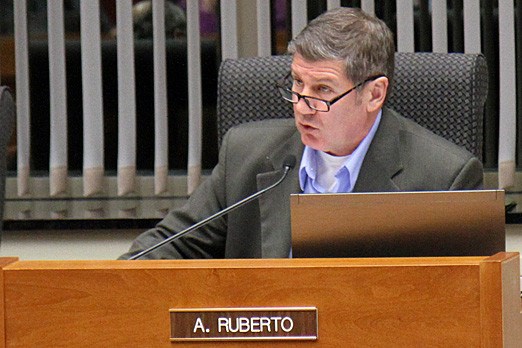THUNDER BAY – A report on a potential nuisance bylaw for the City of Thunder Bay has been delayed again, as city staff advised the controversial idea had generated feedback from the Ontario Human Rights Commission.
It’s the third time the report has been delayed since city council passed a motion requesting it in June of 2020.
Coun. Aldo Ruberto brought forward the proposal, saying it could arm law enforcement with more tools to address complaints he said are typically associated with drug trafficking: excessive foot traffic, poor property maintenance, and unpleasant smells.
Some of his colleagues feared the bylaw would also effectively criminalize poverty and mental health issues.
“We need to be very careful how we use our systems against the poor and oppressed,” warned Coun. Shelby Ch’ng at the time. “This is what systemic racism looks like.”
What resulted was a compromise seeking a report on a nuisance bylaw, but requiring consultation with the city’s anti-racism committee, drug strategy implementation panel, and police service.
The report’s initial September 2020 due date was pushed to December, then to June of this year.
Now it’s uncertain exactly when the report will come forward. Licensing and enforcement manager Doug Vincent advised in a memo it would be included in a “comprehensive, prioritized list” of all regulatory bylaws currently under review, set to come before council in September.
Mayor Bill Mauro called the delays unacceptable at Monday’s council meeting.
“I find it a bit surprising that this is okay,” he said. “I’ve never really understood how council can have a ratified decision that requests a report by a specified date, and we then get a memo that says it’s not coming and it’s as simple as that.”
Mauro acknowledge the strain COVID-19 had put on staff, and said the comment wasn’t meant to single out Vincent’s report, noting the practice had repeated itself several times.
He called for administration to advise of delays ahead of time in the future, so council could give direction on prioritizing work.
The nuisance bylaw should be a “big priority,” he said.
“I would prefer to be bringing a bylaw to you” Vincent responded, but said it was one among a number of competing priorities for the division, including the pandemic response.
He also said it was a complex question that required time for research and consultation, and possibly the use of a consultant.
“Lots of research has been done” already, however, he said.
The city’s existing property standards bylaw includes nuisance provisions, but Vincent said some – like those around excessive noise – were “very weak."
Vincent’s memo also revealed the Ontario Human Rights Commission (OHRC) had contacted the city about the potential nuisance bylaw.
The commission referred the city to a 2020 open letter issued to Kenora’s city council as it considered an anti-loitering bylaw, said Vincent.
In the letter, the OHRC warned Kenora's bylaw would “likely have a disproportionate impact on vulnerable and homeless people.”
Its communication to the City of Thunder Bay “[implied] that we make thoughtful considerations of such impacts in proposing any future by-laws on nuisances,” wrote Vincent.
Ruberto argued the OHRC’s position on loitering was hardly relevant to the proposed nuisance bylaw, rejecting the notion it could enable discrimination.
“I have to say I’m extremely disappointed” he said. “The [report] mentions loitering – we weren’t talking about loitering, we were talking about what other communities are doing to attack drug houses, trap houses.”
Ruberto made a separate push for a loitering bylaw in July of 2020, which council rejected.
Vincent agreed there were clear differences between the Kenora example and the nuisance bylaw under consideration in Thunder Bay.
“Kenora’s staff report clearly indicated the intention of their loitering by-law was directed at marginalized and/or Indigenous persons on City property,” Vincent said. “That is not the intention of the requestor of the report [Ruberto], at least as I understand it.”
Still, he said nuisance bylaws often contain loitering provisions, possibly explaining the commission’s interest. Regardless, he said it was important to take the OHRC's feedback seriously.
“We need to get [this] right – we don’t want the [OHRC] coming back saying it inadvertently, unintentionally is targeting groups of people.”